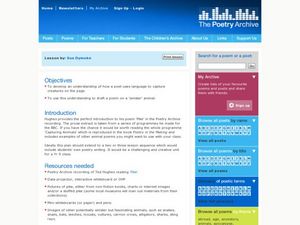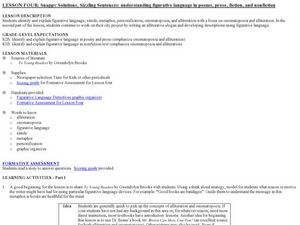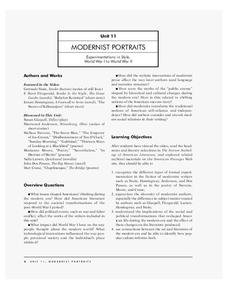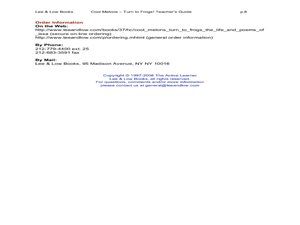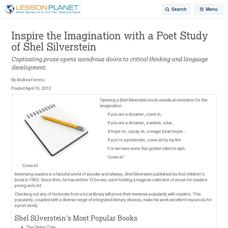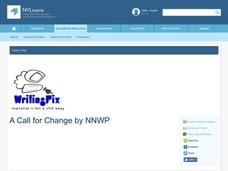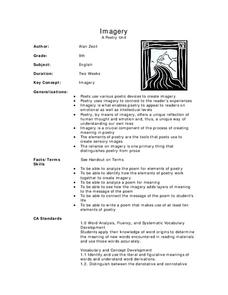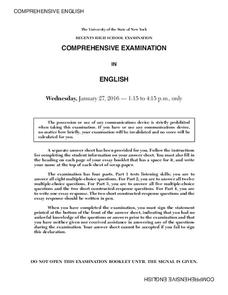Curated OER
Ted Hughes "Pike"
Middle schoolers analyze how a poet uses language to capture creatures and draft a poem on a 'sinister' animal. In this poetry analysis lesson, students read Ted Hughes' poem 'Pike' and analyze pictures of pike fish. Middle schoolers use...
Curated OER
Snappy Solutions, Sizzling Sentences
An examination of the figurative language in Gwendolyn Brooks’ To Young Readers challenges your writers to think about the richness of language. Ask your class why Brooks says, “Good books are bandages.” This discussion of alliteration,...
Curated OER
Figurative Language in Poetry and Prose
Students examine the impact of sound devices in poetry. In this poetry lesson, students read the listed poems and identify uses of hyperbole, simile, metaphor, imagery, and personification. Students discuss how sound devices enhance poetry.
Curated OER
Learning to Love That Poetry
Second graders listen to the novel, "Love That Dog." students reflect in a journal each day about the poetry form learned that day. They create their own poems following that format and have it for class the next day.
Curated OER
Core Poetry and More
Second graders examine poetry in the context of American History in the four lessons of this unit. They read, write, and edit their own pieces in this unit.
Curated OER
An Interdisciplinary Approach to Learning with Walt Whitman
Use poetry as a mode for creating interest and cross discipline learning.
Curated OER
Cowboys
Students analyze cowboy literature. In this United States history and literacy lesson, students listen to a variety of cowboy songs and poetry, view the video "Rediscovering America: The Real American Cowboy," and view related websites....
Annenberg Foundation
Modernist Portraits
How did literature reflect people's attitudes in post-World War I America? A lesson explores the topic using a variety of activities. Individuals watch and respond to a video; read author biographies and engage in discussion; write...
Curated OER
Prize-Winning Prose
Learners develop criteria for 'Kids' Pulitzers,' awards in categories of writing determined by Students. Each student then bestow a 'Kids' Pulitzer' upon a piece of writing which they deem to be distinguished based on the established...
National Endowment for the Humanities
Charles Baudelaire: Poète Maudit (The Cursed Poet)
After learning the main ideas of the Decadent movement, students work in small groups to read and translate poems by the French poet Charles Baudelaire using basic etymology skills. They then read the accurate English translations to see...
Curated OER
Cool Melons Turn to Frogs
Third graders become familiar with the poetry of Issa. In this haiku lesson, 3rd graders recognize the format of a haiku and learn about the life of Issa (the poet) through focused questions, vocabulary and reading responses. Students...
Curated OER
Lesson: Ginger Brooks Takahashi: Powerstich: A Forum for Community-Building
This is a great way to build community in your school, experience process-based art, and explore the critical-thinking process. While quilting as a class collectively (just like a quilting bee) pupils listen to poetry and prose of a...
Curated OER
Testimony: A Lesson in Creating Poetry
High schoolers closely analyze testimony from the Holocaust. They express, in poetic form, meanings students created in their analysis. They react to written passages from the time period.
Curated OER
Survivor Stories
Trace a survivor's story using a timeline, map skills, poetry and/or prose and photography, and make a visual representation of a survivor's journey through his or her life as a culminating activity for the class and the survivor....
Curated OER
Digging Deep for Figurative Language (Hyperbole)
What are hyperboles? Examine the attributes of hyperboles with your high school classes. Pupils read selected poems and prose selections that feature hyperboles and discuss their functions in each work of literature. Specific poems and...
Curated OER
Inspire the Imagination with a Poet Study of Shel Silverstein
Captivating prose opens wondrous doors to critical thinking and language development.
Curated OER
A Call for Change
"Come gather round people, wherever you roam..." Bring the voice of Bob Dylan to your class with this lesson plan, which takes Dylan's song "The Times They Are A-Changing" and analyzes both the message and voice in the lyrics. Your class...
Curated OER
The Language of Our World
High schoolers make inferences about characters in poetry. In this literature instructional activity, students read poetry and prose to determine how characters handle conflict in each of the genres.
Curated OER
Rollin’ on the River: Identifying Jargon
Students identify jargon in poetry, prose and fiction. In this literature lesson, students will read selections from Mark Twain and identify figurative langauge, focusing on jargon.
Curated OER
A poem about India
Young scholars read and discuss the poem Khwab before writing poems of their own. Students get the opportunity to explore impressionistic poetry about place.
Curated OER
Poetry
Students read poems from the book Runny Babbit and do language arts activities based on the book. In this language arts lesson plan, students read poems from the given book and do activities that include a word finder, rhyming...
Curated OER
Imagery
Ninth graders explore poems, various poetic devices, and identify imagery used in poetry. In groups, they examine poetic devices, define them, paraphrase and summarize poetry. Students study poetry by Robert Frost as they explore...
New York State Education Department
Comprehensive English Examination: January 2016
Poetry and prose often have more in common than it initially appears. A sample comprehensive English exam has test-takers compare and contrast two passages to answer short response questions. The exam, which is part of a larger set of...
Other popular searches
- Prose Poetry
- Compare Poetry and Prose
- 104 Prose Poetry
- Poetry Prose Drama
- Checklist of Poetry and Prose
- Compare/contrast Prose/poetry
- Fiction Prose Poetry
- Writing Prose Poetry
- Cehcklist of Poetry and Prose
- Prose Poetry Characteristics
